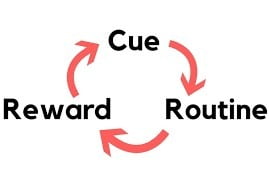Bad habits are notoriously hard to break – and even harder if it’s an addiction.
Although not all bad habits morph into addictions, many – if not most – addictions start out as seemingly innocent bad habits.
So why are bad habits and addictions so hard to break?
To understand why, it’s important to learn how we form these habits and addictions in the first place. When you understand how bad habits work, you understand the things you can do to turn your life around the other direction.
The Habit Loop – How We Form Habits
Habits are complex psychological matters, mainly because every person is different.
Science and research, however, have found that all habits are formed and developed in a similar way.
In his book “The Power of Habit”, Charles Duhigg writes that MIT researchers found a simple neurological loop that underlies every habit. This is called The Habit Loop. This loop is made up of three main parts: Cue, Routine and Reward.

The Cue is something that triggers an action or activity. This cue could be anything, and it depends entirely on the person. It could be smelling a certain scent, hearing a particular sound, seeing a specific item or even experiencing an intense emotion.
The Routine is the action or behaviour that you perform in response to the cue. This is the action that you develop into a habit.
The Reward is the positive feeling or reinforcement that you get or experience as a result of performing the action in the Routine. This positive feeling – no matter how small or temporary – makes your brain associate it with the action you did (Routine) and the event that triggered it (Cue). When you get this reward enough times through this process, your brain begins to crave it and seek it, thus reinforcing the loop.
Let’s take an example: Suppose you love eating a chocolate bar every afternoon at work.
The cue could be a certain time of day that triggers this habit, say your 3:00pm snack break. Your Routine could then be going to your office pantry, picking up a chocolate bar and eating it during your 15-minute break. The Reward is the sweetness of the chocolate and the temporary high you get from it. When you do this enough times, it can develop into a habit that makes you crave it every afternoon around 3:00pm, even on days when you’re not in the office.
Why It’s Difficult to Break the Habit Loop
Habit Loops are difficult to break for two main reasons:
- They’re self-reinforcing.
- They become more automatic the more you do them.
Habit Loops are self-reinforcing loops, where each component feeds into the other. We associate the Reward with the Routine and the Routine with Cue. The positive feelings we get from the Reward also makes us seek or crave the Cue over time, which drives the entire loop deeper into your system.
When done enough times and with enough reinforcement, the Habit Loop then becomes automatic. We end up spending less energy and thought doing it until it feels like the norm. That’s why bad habits are so hard to break – because they feel like it’s simply what we do. In cases like these, the habit has become so deep-seated in our behaviours that not doing it seems abnormal, or in the worst and most ironic cases, not good for us.
Why It’s Even More Difficult to Break Addictions
At this point, it’s important to note that bad habits and addictions are two completely different things. Habits are learned behaviours that we develop to achieve a goal or feeling. In the case of bad habits, it’s often to satisfy developed cravings.
An addiction, as defined by the Australia’s Department of Health, is the physical or psychological need to do something, even though it is harmful to you.
Addictions are harder to break than bad habits because they’re more ingrained in our system and they have deeper physical and psychological roots. They therefore require a greater amount of time, effort and planning to break.
In fact, many forms of addictions need professional guidance to break effectively, requiring counselling, treatment and careful monitoring and planning.
It May Be Hard, But Change is Possible – Getting Help from Professionals
Although breaking bad habits and addictions is difficulty, it’s not impossible.
With the right help and coping techniques, breaking these detrimental behaviour patterns isn’t just possible, but also likely.
By identifying and understanding the components of your Habit Loop, you can experiment and manipulate different factors to produce different and better results.
The other good thing about Habit Loops is that they also work both ways – you can use them to create good habits and positive behaviours.
Remember that if you’re bad habit has progressed into an addiction, there are plenty of professional services available to help you address them. Professional treatment and counselling for addictions are available with a Brisbane psychologist that can help you identify issues properly and create the best plan of action to face and resolve them.
Need More Help?
If you want to find out more about breaking bad habits and addictions, or if you’re looking for professional treatment for addiction counselling, we’re more than happy to help you. Simply call 07 3211 1117 or send us a message to get in touch for an in-office or online counselling sessions.


